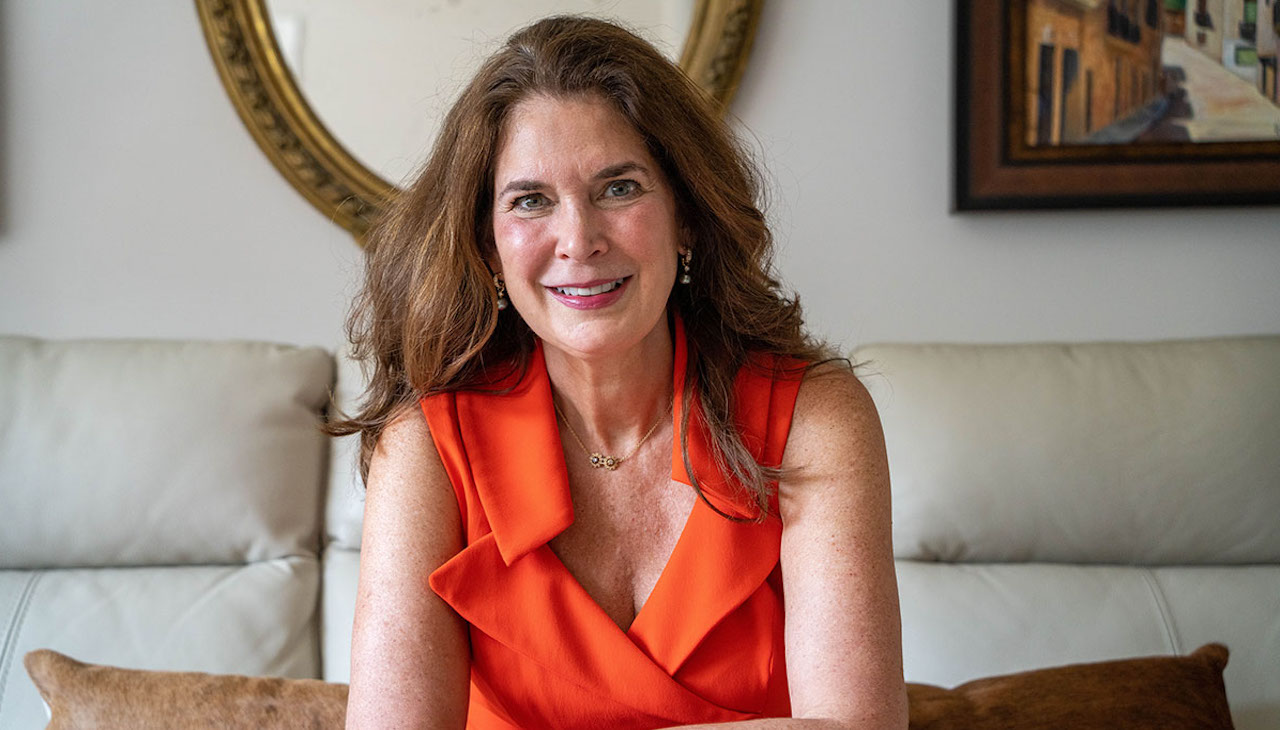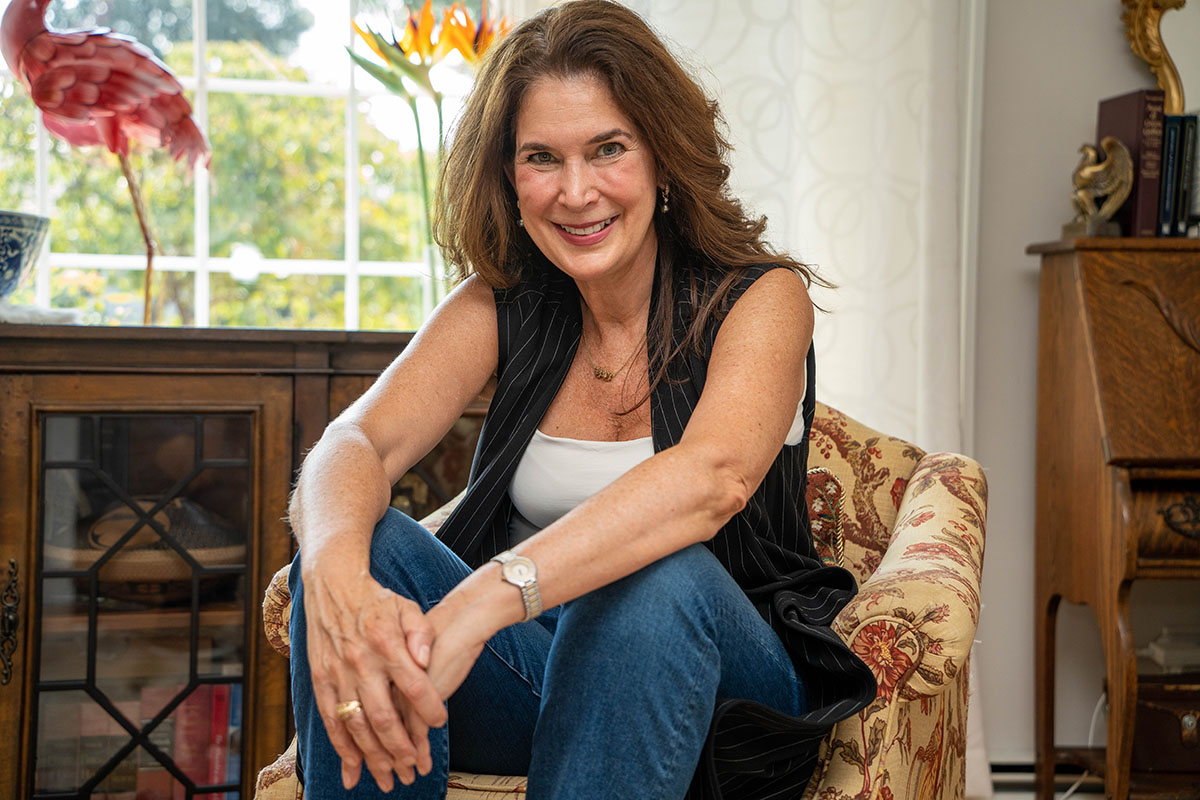
Ana Marie Argilagos wants to show that Latinos are major players in the philanthropy world
Argilagos is AL DÍA's 2022 Philanthropy Archetype, and has led Hispanics in Philanthropy since 2018.
In philanthropy, there’s long been a myth about Latinos and their capacity to give to causes and relief efforts. The narrative, which many still deem true throughout the industry, is that Latinos don’t give.
Those who still think that way have never met Ana Marie Argilagos.
The President & CEO of Hispanics in Philanthropy (HIP) since 2018, Argilagos has made it her mission to flip that myth about Latinos on its head.
“We’re givers, we’re philanthropists, but we don’t see ourselves as philanthropists, we don’t see ourselves as donors,” she told AL DÍA in a recent interview as it honors her as its 2022 Philanthropy Archetype for Hispanic Heritage Month.

An industry still behind
The myth is an endemic flaw of the philanthropic industry itself, where diversity still lags behind the country’s real picture in both employment and especially where funds are directed.
According to a 2020 Diversity Among Philanthropy Report from Change Philanthropy, 45.3% of professionals in the industry identified as people of color, with almost 9% identifying as Latinx. Per 2020 Census data, the country is now almost 20% Hispanic.
It becomes dire when looking at what percentage of philanthropic funds go to Latinx populations. In the latest batch of data from HIP’s Latinx Funders Dashboard, only 0.8% of all philanthropic funds distributed between 2013 and 2018 went towards Latinx populations. In 2018, the last year listed, the percentage dropped to 0.6%.
During the pandemic, Argilagos cited how that trend continued in the percentage of Latino-owned businesses that received any kind of vital government assistance like Paycheck Protection Program loans (PPP loans).
The combination leads to an overall lack of understanding regarding the community when it comes to how it gives. It’s part of Argilagos’ mission to educate on the issue.
“We don’t give in traditional ways,” she said, citing how funding from the Latino community doesn’t funnel through common channels like community foundations or the United Way.
In a more common case, especially for immigrant communities, those dollars go to church. For Latinos with a higher net worth, those funds often go towards things like buildings on college campuses or other educational efforts, mirroring the common emphasis on education within the Latino community nationwide.
To begin to flip the script, she said she wanted to “galvanize a movement of Latinos as givers.”
“At the core, I wanted to create movimiento,” said Argilagos.
That core mission has roots that go back to her origins, where social justice took center stage and guided her career.
A harsh awakening
Argilagos was born in Puerto Rico and took her first steps on the beaches of Isla Verde, a neighborhood of Carolina, which she calls her “little slice of paradise.”
“When we were three months, we were getting thrown into the beach,” she said.
At six, her family moved to Miami. There was a short interlude in Costa Rica for the family as her dad chased early television dreams, but it was Miami, specifically SW 8th Street in Little Havana, where Argilagos grew up and had her “tiny bubble.”
When describing her upbringing, she pointed to former U.S. Poet Laureate Richard Blanco’s memoir, The Prince of Los Cocuyos. Argilagos is Puerto Rican, but the story of a Cuban family adjusting to life in Miami in the 70s and 80s, holding onto some traditions and letting go of others, while young protagonist Riqui dealt with his own crisis of identity growing up in America, struck a chord.
“My family was definitely shell shocked,” Argilagos said of the early experience. “We didn’t trust anyone. We trusted only people that were like us. We tried to cling to old ways and old customs.”
In the same vein as Riqui’s coming-of-age, Argilagos said she always felt “in between cultures” — the Cuban-Puerto Rican part, and the American part, “which was where we landed, was all around us, and which we definitely didn’t understand.”
The bubble burst around Argilagos’ tiny world in 1980, as Miami was the center of what was then the worst race riot in a generation.
It happened over three days predominantly in the city’s Black neighborhoods of Liberty City and Overtown, after an all-white jury acquitted six white police officers on May 17, 1980, in the beating death of Black insurance salesman and Marine lance corporal Arthur McDuffie. He was 33-years-old, and the beating happened after McDuffie was pulled over by officers in the early morning hours of Dec. 17, 1979.
At the time, Argilagos was 15 and holding down her first job as a cashier at a pharmacy on one of the top floors of Miami’s Omni International Mall. The police arrived and didn’t allow anyone to enter or leave until the riots calmed down. She spent a few nights at the hotel attached to the mall.
“I remember being on the roof deck of that beautiful hotel, just looking and seeing the whole skyline burning,” said Argilagos.
It was a brutal way to realize her place in the city and world, but one that set her on the path of social justice.
“How can we make the world different?” became a prominent question in Argilagos’ life. “I think all the social justice threads to my life can be traced to that.”
The missing piece
When it came time to apply for college, despite her parents’ thoughts that she would go to be a lawyer, doctor, or they’re favorite — a secretary — Argilagos had her eyes on Washington D.C. to study things like policy and more importantly, how to change it.
“I didn’t know what systems change was back then, but that’s definitely what I wanted to do,” she said.
It brought her to American University on a full ride, and Argilagos would graduate and take a role at Ayuda, an immigrant legal services center, before moving to the National Association of Hispanic Journalists (NAHJ), and then again to the National Council of La Raza (NCLR) under Raul Yzaguirre.
“It was community organizing, then running programs, then activism and advocacy, and data,” said Argilagos, but one piece was missing — the governmental aspect.
For that, she went back to school as an Esteban Torres Fellow at the Harvard Kennedy School of Government. There, she met Xavier Briggs, who brought her on as a special assistant at the Department of Housing and Urban Development during the Clinton Administration.
RELATED CONTENT
“Inside the belly of the beast,” Briggs told her. “It’ll be an amazing education.”
“If you don’t like it, leave after six months,” he continued. “I stayed for three years,” Argilagos said.
A calling

After Al Gore lost in the 2000 election, she went into philanthropy at the Annie E. Casey Foundation, where she helped create what were then groundbreaking, new portfolios to invest in Latino and Native American communities.
“It was like a calling, really,” said Argilagos. “It was a responsibility because at the time, there were very few Latinos in philanthropy. I felt like it was my responsibility to represent.”
She was one of three Latinos at the foundation, which employed 200. Regardless, Argilagos called the Annie E. Casey Foundation “one of the good guys,” and said a lot of the work around developing frameworks and theories of change extend to work seen today when it comes to justice and racial and ethnic equality.
“It’s been wonderful to see it take off,” said Argilagos of recent philanthropic developments. “We’ve definitely needed this tsunami of an understanding of ‘what does this mean?’ And that has to be inside as well as external for it to be deep and meaningful.”
After nine years at the foundation, Argilagos returned government under the Obama Administration, finally as a secretary to her parents’ delight, rising to be Deputy Assistant Secretary for HUD’s Office for International and Philanthropic Innovation.
Five years later, and feeling tapped out, Argilagos joined the Ford Foundation to tackle more global governmental issues like sustainable development and the Paris Climate Agreement. She told AL DÍA that she would’ve stayed at that job forever had the U.S. not elected Donald Trump, a major inflection point in both U.S. history and her life.
“I felt that it was a moment that we needed to call everyone back, all hands on deck in the U.S., and build democracy,” said Argilagos.
A new “movimiento”
It was then, in 2018, that she landed the HIP job, taking over after the 27-year run of Diana Campoamor. She had big shoes to fill, but an organization ready to embrace change and attract a younger generation.
Since then, it’s been all about “movimiento.”
In addition to demystifying Latino donors, Argilagos has also been intentional about investing in Latino-owned businesses and entrepreneurs in hopes of expanding the Latino ecosystem of donors.
“To do that, we had to take people from surviving to thriving,” she said.
In the process, HIP has gone from 50 members to over 500. Employee-wise, there are now 50, up from the 17 she started with.
Argilagos’ goals are also numerous. Beyond the new funds around democracy and power, and climate and migration, she hopes to eventually establish a massive one for the entire Latino community that is stable over time and can be tapped in the event of an emergency. It would be similar to those found in other ethnic communities.
“Each time there’s an emergency, we start from scratch,” said Argilagos.
If she has her way, it won’t be like that for very long.











LEAVE A COMMENT: